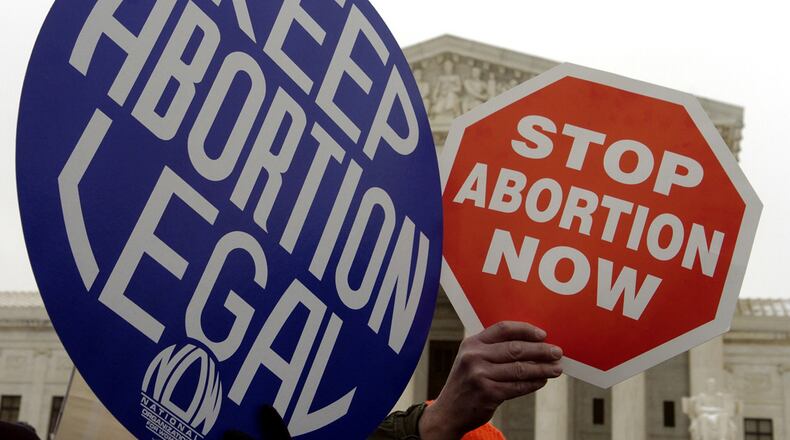Since 1973 when the Supreme Court issued its decision in Roe v. Wade and effectively protected women’s right to have an abortion, the political debate surrounding the emotionally charged issue was, ironically, almost risk-free.
Federal candidates often dodged the issue by saying they believed, as the Supreme Court said, that the policy should be for the states to decide.
State-level lawmakers could vote for, and even pass, the most restrictive abortion laws imaginable knowing that the sitting justices on the Supreme Court would keep Roe v. Wade intact. The makeup of the court over the last forty years virtually guaranteed it.
But when conservative Justice Amy Coney Barrett joined the court after the death of Ruth Bader Ginsburg in 2020, the ideological makeup of the court shifted dramatically — as did the future of abortion in America and in Georgia.
Last week, the court declined to intervene in a lawsuit against Texas’ new abortion law, which will now ban abortion at about the sixth week of pregnancy, before most women know they’re pregnant. For all practical purposes, the Texas law bans abortion altogether.
Georgia lawmakers passed their own six-week abortion ban in 2019, with a personhood amendment added to it. The details of Georgia’s law differ from that of Texas’, but it, too, will ban most abortions in Georgia before women know they are pregnant.
The older I’ve gotten, the more I’ve understood through the experiences of women I know that abortions are not limited to a 16-year-old girl and her unwanted pregnancy with her football player boyfriend.
Too often, a pregnancy is not only wanted, but desperately awaited, only for parents to learn of an unborn baby’s terminal illness. Or a mother’s cancer that must be treated quickly enough to save her life, but possibly at the cost of the life of her unborn child.
Those complications aren’t reflected in the bumper-sticker politics surrounding the abortion debate, of course, mostly because abortion has been considered settled law for so long.
But with the Texas law going into effect, the issue is now very real. And it’s already presented a stark contrast between some of the candidates in Georgia’s most competitive races, because lawmakers now really are deciding for women what they can and cannot do in the future.
The clearest contrast is in Atlanta’s northern suburbs, where two Democratic women, U.S. Reps. Lucy McBath in the 6th District and Carolyn Bourdeaux in the 7th, flipped seats for Democrats in the last two cycles.
Both spoke out immediately to condemn the Court’s decision to let the Texas law stand. “This Texas bill is dangerous, full stop,” McBath wrote in a message to supporters.
Bordeaux, too, slammed the decision in a post on Facebook. “This is what we’ve been warning would happen!” she wrote. “Last night, SCOTUS undermined 40 years of precedent and effectively overturned Roe v. Wade. If it can happen in Texas, Georgia can’t be far behind.”
Even though recent election results in the 6th and 7th districts have shown voters growing more diverse, more progressive, and more Democratic (Joe Biden won the 6th by 12.5 points in 2020 and the 7th by six points), several Republicans running for both House seats came out last week calling for Georgia’s 6-week ban to go into effect, too.
Jake Evans, one of six Republicans running against McBath, wrote on Twitter, “As a Christian, I believe the fight for life is one of the most important battles of our generation and Georgians must demand that courts allow our state’s Heartbeat Law to take effect.”
A spokesman for ER physician Rich McCormick, a Republican running against Bourdeaux, said in a statement that he, too, supports a six-week ban.
“Dr. McCormick believes that a beating heart is one of the telltale signs of life. Purposefully ending life is inconsistent with his oath and duty as a physician. Accordingly, Dr. McCormick believes a child in the womb is a living being and its rights should be protected.”
Meagan Hanson, another GOP candidate in the 6th district, left the General Assembly before lawmakers passed the so-called “heartbeat bill,” but she wrote on Twitter, “As the only candidate in #GA06 with a pro-life voting record, I will continue to support the pro-life movement and oppose the abortion-on-demand agenda of the far Left.”
But her office declined to offer more specifics on whether she supports the six-week ban or personhood language in the Georgia bill.
The issue is sure to become a major contrast between candidates for U.S. Senate, too.
Democratic U.S. Sen. Raphael Warnock condemned the Texas law, saying it, “effectively eliminates the protections of Roe v. Wade—putting millions at risk, particularly people of color and of low-income.”
All four of the Republicans running against Warnock spoke out in favor of the decision.
Latham Saddler said in a statement, “If the Texas law can go into effect then Georgia’s heartbeat law should too. With our medical technology today, we can no longer deny the distinctly human form and heartbeat that develops at even the early stages of pregnancy.”
Kelvin King and Gary Black both slammed Warnock for acting as a pastor and advocating for access to abortion. Black called Warnock’s position “appalling,” while King wrote on Twitter, “Shame on you, senator.”
And after days without speaking out about the Texas law. a spokeswoman for Herschel Walker said in a statement to the AJC Tuesday, “Herschel Walker is strongly pro-life. He will always stand for the unborn and he will support constitutional conservatives for federal judges.”
Candidates’ positions on abortion are no longer risk-free. The positions they take now could not only affect the outcome of the 2022 elections, but, more importantly, the lives of millions of women and families in Georgia in the future.
About the Author
Keep Reading
The Latest
Featured



